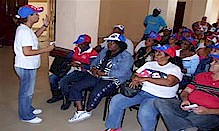
Mayra Villafranca explains the Cuban health mission in Haiti to new personnel arriving in the fellow African-Caribbean nation. Haiti suffered an earthquake of Jan. 12, 2010 and was hit by a cholera epidemic in Nov.
Originally uploaded by Pan-African News Wire File Photos
Cuba meets its commitments and Haiti responds
By Juan Diego Nusa Penalver
WITH the recent arrival in Haiti’s capital, Port-au-Prince, of a group of 75 Cuban volunteer health workers, Cuba has more than fulfilled its commitment to send additional health personnel to confront the serious cholera epidemic which this neighboring Caribbean nation is suffering.
More than 114,000 Haitians, almost all of them from the poorest social sectors of the country, have been infected with this disease.
With this new group, the Cuban government almost immediately met its commitment to the Haitian authorities, announced by Comandante en Jefe Fidel Castro, in his November 27 "Haiti Reflection: underdevelopment and genocide," to reinforce the Cuban Medical Brigade (BMC) with 300 new doctors, nurses, and health technicians.
The BMC now numbers 1,235 members: 501 physicians, 404 nurses, 244 technicians and 86 support staff. This whole solidarity contingent is linked in one way or another to battling Haiti’s cholera epidemic, which is continuing to spread throughout this nation, particularly in areas with extremely poor sanitary and environmental conditions.
In a statement to Granma, Lorenzo Somarriba López, Cuban deputy minister of health and general coordinator of the BMC, explained that the recent arrivals are to be assigned to complete the staffing of 14 cholera treatment centers provided by the BMC, located throughout Haiti’s rugged terrain.
Dr. Somarriba added that this reinforcement will make it possible to fully staff 40 active research groups (GPA) initially anticipated to move, with their backpacks, to 207 rural and mountainous sub-communes of difficult access and lacking adequate medical services, where cholera is creating creates unforeseen ravages and bringing mourning and fear to Haitian families.
In a few days the 32 organized GPA’s have made a study of more than 106,000 people in those remote rural areas and have treated 657 Haitians, who would have died from the disease if they had not received timely medical help.
Moreover, these small mobile groups of no more than five brigade members, including a Haitian doctor graduated from Havana’s Latin American School of Medicine, are undertaking important preventive-educational work among the local people, and distributing oral rehydration salts and chlorine to make water safe for human consumption. The Cuban volunteers are also working in the 40 cholera treatment units.
Without any doubt, the congratulations transmitted by Esteban Lazo, member of the Political Bureau of the Communist Party, came as an added stimulus to the labors of the BMC, whose members have saved the lives of more than 41,000 Haitians suffering from cholera, maintaining a low death rate which has remained at 0.75%.
That spirit of solidarity of the Cuban health volunteers was present in the words Arelys Nápoles Medina, a recently arrived nurse from Holguín, who reiterated the disposition of this troop of Fidel to be the last to leave and to never surrender to an epidemic which is striking at the heart of this nation. Cuba is meeting its commitment and Haiti is responding.
Courtesy of Granma International
No comments:
Post a Comment